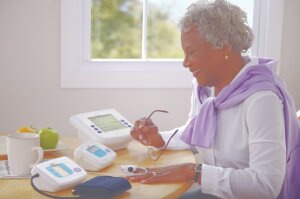by
Olga Deshchenko, DOTmed News Reporter | March 29, 2011

Image courtesy of
Philips Healthcare
From the March 2011 issue of HealthCare Business News magazine
Over the next year, a group of patients in the Greater Boston area, recently hospitalized for congestive heart failure, will put technology to the test. Could a home-based patient monitoring system keep them from returning to a hospital bed?
Launched in January, the 13-month demonstration study will enroll 200 patients. It’s being run by the New England Healthcare Institute, a Cambridge, Mass.-based nonprofit health policy institute pursuing innovations to improve health care quality and reduce costs. As one of the entities selected to be a part of the Remote Patient Monitoring Diffusion Grants Program administered by the Center for Technology and Aging, NEHI was awarded $100,000 to fund a part of the study. (The Massachusetts Technology Collaborative is the primary funder of the study.)



Ad Statistics
Times Displayed: 136672
Times Visited: 7927 MIT labs, experts in Multi-Vendor component level repair of: MRI Coils, RF amplifiers, Gradient Amplifiers Contrast Media Injectors. System repairs, sub-assembly repairs, component level repairs, refurbish/calibrate. info@mitlabsusa.com/+1 (305) 470-8013
“We are in the process of implementing that study right now,” says Lisa Payne Simon, NEHI’s senior program director. “The goals are to measure the financial and clinical benefits and also see how patients like it and how physicians like it.”
NEHI is looking at remote patient monitoring as part of its Fast Adoption of Significant Technologies initiative. The program zeroes in on emerging technologies with potential to benefit health care, but which lack clinical research to support them.
So far, NEHI has been successful with its FAST targets – the previous two include computerized physician order entry and tele-ICU technology. “Home telehealth is the third of these demonstration studies that NEHI has done showing that the technology holds promise in terms of quality, cost and better monitoring of care,” says Simon.
For the study, NEHI selected the Philips TeleStation, a system that will relay vital signs data and clinical information via a Web portal to the responsible clinician at Atrius Health, an alliance of five physician groups across eastern Massachusetts partnering with NEHI to carry out the study.
In addition to tracking key clinical stats, physicians can use the TeleStation to customize questions and reinforce specific areas of concern for the patients using the system. “One of our hypotheses is that in time, patients will learn what to look for and will learn how to do this monitoring of their conditions and internalize some of the questions that they’ll be answering on a daily basis, so potentially the technology won’t have to be used permanently,” says Simon.

